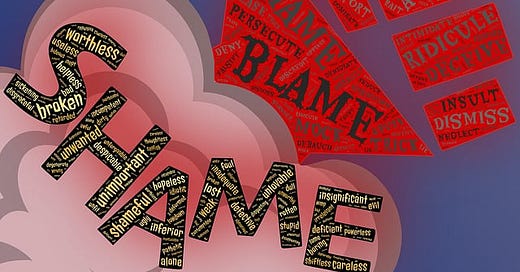Self-Blame, Self-Criticism, and Shame
“Self-blame is a cognitive process in which an individual attributes the occurrence of a stressful event to oneself. The direction of blame often has implications for individuals’ emotions and behaviors during and following stressful situations.”
“Self-blame is common among adult sexual trauma survivors and it is very common among children who grew up in situations where abuse occurred. Guilt is a sign that the person has not completed his or her grief.”
“A distressing side effect of shame, self-blame, and guilt is that it is emotionally exhausting, undermining our sense of self-worth and competency. “
The old saying is, “It takes two to Tango.” I have often said this to clients who blame themselves for everything from their divorce to many other events. To emphasize their cognitive distortion, I’ve even told some individuals, “I know you’re responsible for climate change, the earthquake in Turkey.” It is not meant to be funny. I explain how readily they blame themselves for everything in their lives.
I have worked with patients who entered psychotherapy because of depression over their divorce. These patients included people who were recently divorced. Some divorced long ago. Some blamed themselves for their lost marriages.
In several cases, people blamed themselves for not recognizing problems with their ex-partner when dating. The result was that they were ashamed of themselves and embarrassed by what they saw as an unforgivable error. They were convinced there were warning signs it would not be a good marriage and ignored those signals.
People have an endless capacity to be self-critical because of the unrealistic belief in perfection.
There are many examples of people who were blamed, by their parents, for an entire list of problems at school and in the home and family. Many years ago, one of my patients remembered an argument between his parents. When he asked his mother if the argument was his fault, she said yes. He continued to blame himself for everything that happened in his marriage and among his children.
Perfection is written about in other articles. The fact is that all of us are imperfect. That imperfection leads some people to self-blame for every perceived failure. Feelings of low self-worth, insecurity, and incompetence result from this thinking. Therefore, learning self-compassionate is essential. What is self-compassion? According to Kristin Neff, Ph.D., self-compassion has these three things:
1. Self-Kindness
2. A Sense of Common Humanity
3. Mindfulness
Self-Kindness allows for imperfection and self-forgiveness. We share many of the same things with other people. It is the opposite of the steady stream of criticism that we direct at ourselves. It is the opposite of self-hate which permeates the psychology of too many people.
The question is how to develop self-compassion. The answer lies in what is called “mindfulness.” Mindfulness is focusing attention on the present moment without judgment. Meditation is used to accomplish this. Mindful meditation focuses on living in the present moment while letting thoughts drift away. I encourage the reader to go to the website of Kristin Neff:
https://self-compassion.org/
https://self-compassion.org/guided-self-compassion-meditations-mp3-2/
Keep in mind that self-compassion includes compassion for others.
Your comments are encouraged.
Allan N. Schwartz, PhD





